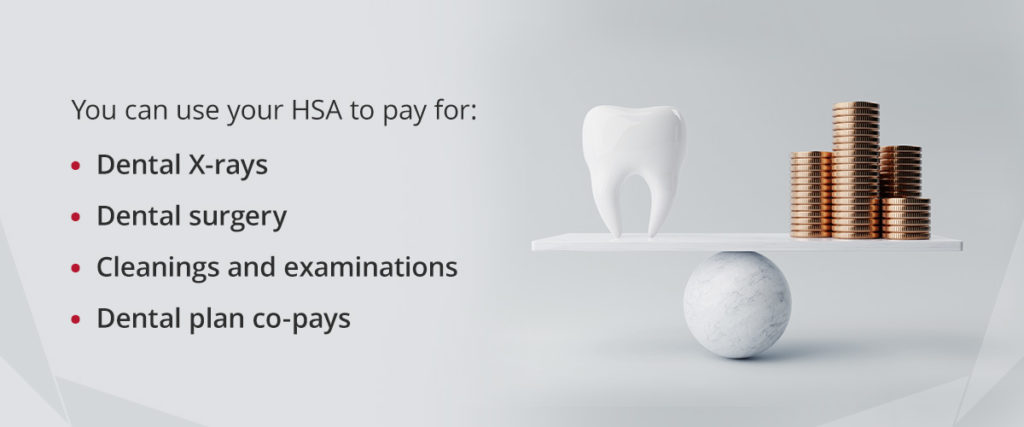When it comes to saving for your health care expenses, you have several options. One plan you might consider is a health savings account (HSA), a type of savings account that allows you to save for and pay health care expenses with tax-free savings. With careful planning, an HSA can be a significant asset as you plan for your future.
An HSA is a highly beneficial savings account because when you use it properly, you never pay taxes on your money. Besides saving on taxes when you make payments into your HSA, your savings also grow tax-free in your account. Further, you can make tax-free withdrawals to pay for eligible expenses in retirement.
This guide can help you understand what a health savings account is and how it works.
What Is a Health Savings Account?
An HSA must be paired with a qualifying high-deductible health plan (HDHP). Under this plan, an HSA allows you to contribute pre-tax earnings for current or future health care expenses. HSAs are federally insured savings accounts, and the money belongs to you. That means you can keep your savings year-to-year even if you become unemployed or uninsured.
HSAs offer a triple tax advantage — when you make payments, over time and when you make withdrawals. These accounts can ultimately lower your overall health care costs. You can use your HSA funds on eligible medical expenses at any time and for general living expenses when you retire.
However, you must follow some rules from the Internal Revenue Service (IRS) for withdrawing from an HSA. For instance, spending your HSA money on non-qualifying expenses before retirement requires you to pay a tax penalty on the funds. You also cannot use HSA funds to pay for insurance premiums. However, the list of eligible expenses is extensive.
Although the list of eligible expenses is subject to ongoing IRS consideration, you can spend your HSA funds on three main categories of expenses:
1. Medical
The medical expenses you can pay with your HSA savings include:
- Co-pays
- Co-insurance
- Chiropractor visits
- Vaccinations
- Some operations
- Over-the-counter (OTC) medications
- Maternity and fertility services
- Physical examinations
- Vasectomies
- Hearing aids
- X-rays
2. Dental
You can use your HSA to pay for:
- Dental X-rays
- Dental surgery
- Cleanings and examinations
- Dental plan co-pays

3. Vision
HSAs are also helpful for those who need:
- Glasses and contact lenses
- Eye examinations
- Eye surgery
- Guide dog services
- Vision plan coinsurance and deductibles
How Does a Health Savings Account Work?
A breakdown of the health savings account rules is helpful for understanding how an HSA works. Here are the general steps you might take to take advantage of an HSA:
1. Pair With an HDHP
To open an HSA, you must first enroll in an HDHP. This is because an HSA covers the expenses your HDHP doesn’t. An HDHP is a high-deductible plan that only covers preventative services before the insurance company starts to pay its share. This type of plan offers low monthly premiums, making it appealing to many Americans. The disadvantage of an HDHP is you have to pay more out-of-pocket for health care expenses before the deductible kicks in.
What does the IRS count as an HDHP? For the calendar year 2022, HDHPs have a $1,400 minimum deductible for individual plans or a $2,800 minimum for a family plan. If you have an individual HDHP, your yearly out-of-pocket expenses for health care expenses within your network cannot exceed $7,050. The total amount you might have to pay out-of-pocket for a family increases to $14,100.
2. Make Contributions
Once you enroll in an HDHP and open an HSA, you can contribute to your savings account. HSA contributions are either tax-deductible or pre-tax. You can deduct tax-deductible contributions from your yearly income when you file taxes. Pre-tax contributions come from your payroll and do not add to your annual taxable income.
The more money you contribute to your HSA, the more you can lower your annual taxable income. You can choose to make regular contributions or do it occasionally. The money in an HSA also rolls over from year to year, so you can continue saving as long as you want.
Keep in mind that the IRS has set contribution limits on HSA accounts. For the 2022 calendar year, individuals can contribute a maximum of $3,650 and families can contribute a maximum of $7,300.
3. Earn Interest
Once you contribute to your HSA, your money earns interest over time. This is the same as other savings accounts, with one notable difference — the interest your HSA funds earn is tax-free. How do HSA accounts make interest? Every month, interest is calculated according to the applicable rate for your account’s balance. Interest is also compounded monthly.
You can choose to invest a portion of your HSA funds into stocks, bonds or other financial securities once you reach a certain balance in your account. This strategy is another way to earn capital gains on your HSA savings.
4. Make Withdrawals
When you need your HSA funds to pay for eligible health care expenses, you can withdraw any amount at any time. You aren’t required to take distributions yearly, as the savings roll over to the following year. HSA distributions are also tax-free.
Remember that if you want to use the money for non-eligible expenses, it will be taxed as regular income. The IRS also imposes a 20% tax penalty for spending HSA money for reasons other than to pay health care costs.
If you are 65 or older, withdrawals work differently. You can take distributions from your HSA for any reason, including non-eligible expenses, without paying the IRS tax penalty. However, non-eligible expenses are subject to regular income tax. You can also use HSA funds to pay for Medicare insurance premiums.
Who Uses Health Savings Accounts?
Many Americans are using HSAs to cover health care expenses and plan for retirement. To qualify for an HSA, you must meet these IRS requirements:
- You have health coverage under an HDHP.
- You are not covered under any non-HDHP health plan.
- You are not enrolled in Medicare.
- You are not claimed as a dependent on someone else’s tax return.

If you qualify for an HSA, you can benefit in several situations. The people who use HSAs include:
1. Those Who Want Lower Health Insurance Premiums
Health insurance premiums can take a considerable amount of your paycheck. Switching to an HDHP/HSA combo is an excellent way to lower monthly health insurance premiums. Opting for an HDHP means your monthly premiums will be considerably lower, which could end up saving you a significant amount on health insurance every month.
This system is beneficial if you don’t have regular health care expenses or if you could easily handle them with the funds in your HSA. You can put the money you save on premiums into your HSA and use them for out-of-pocket expenses like prescriptions, deductibles and co-pays. This strategy enables you to build a nest egg for future medical expenses that you can withdraw tax-free.
2. Those Who Rarely Get Sick
Although people can use an HSA to pay for several common medical expenses, this kind of savings account is especially helpful if you rarely need to see a doctor. Many people decide that with their health, the best financial decision is to go for a high-deductible plan. With an HSA, people can use the money they would have spent on a higher premium and save it for the future when they need to pay for larger expenses.
Another reason many people choose an HSA is that their funds stay with them rather than their employers. People can choose to invest in an HSA for 30 or 40 years in the future when they retire and need more money for health care expenses.
Even if people get sick, their HSA can often provide the funds they need if they’ve regularly contributed to the balance. However, those with high health care expenses may want to select a different plan. Since the deductibles for HDHPs are so high, people with chronic illnesses who anticipate spending a lot on health care may want to lower their out-pocket costs by choosing a plan with a lower deductible.
3. Those Who Want to Save for Retirement
An HSA may not be the first thing you think of when planning for retirement, but it can be an excellent strategy to save money for retirement. After years of contributing to an HSA, you can have a considerable amount of money for your medical expenses during retirement. The advantage of using an HSA for health care costs during this time is that they are tax-free upon withdrawal.
Using your HSA to pay for eligible expenses during retirement can save you money on taxes. You can also use your HSA to pay for most of your health care costs and preserve your other retirement savings for other expenses. You can spend your HSA funds on non-eligible expenses after you turn 65, although you’ll have to pay income taxes on the money.
An HSA could be a significant part of your long-term financial strategy.
Benefits of HSAs
You can use HSA funds to pay for a variety of expenses. These accounts are portable and offer numerous other advantages. Learning about some HSA pros and cons can help you decide whether to fund your health care costs this way.
1. Tax Savings
One of the most significant advantages of opening an HSA is the tax savings. Most contributions are pre-tax, but even after-tax contributions are tax-deductible. With tax-free withdrawals for eligible health care expenses and tax-free interest, an HSA can save you a considerable amount in taxes every year.

2. Employer Contributions
If you open an HSA through your employer, they may contribute to your account and even match the amount you pay into it. Employer contributions are also tax-free, meaning you can exclude them from your yearly income even though the money is technically yours. If your employer offers to contribute to your HSA, you can considerably increase your account’s balance.
3. Retirement Funding
Another important benefit of HSAs is the ability to save for retirement. When you turn 65, you can treat your HSA funds like another individual retirement account (IRA). You can take distributions for eligible expenses tax-free or use the funds on other costs and avoid the IRS penalty. If you don’t enroll in Medicare, you can keep contributing to your HSA for as long as you want.
4. Opportunities for Investment
You can also help you fund your retirement by investing some of your HSA savings into financial securities. An HSA is an excellent alternative investment vehicle for various investment types. You can invest in stocks, bonds and other financial securities.
If you use this strategy, you can boost your HSA’s returns even further. However, be aware that investing in securities within your HSA carries risk and isn’t the best option for everyone. It can be helpful to seek advice from financial experts before investing.
5. Receipt and Expense Tracking
Your HSA might offer additional features that help you in the long run. For instance, keeping track of your receipts and all relevant documentation regarding what you purchase with your HSA funds is essential.
Expense tracking proves you spent the money on eligible expenses and helps you avoid paying taxes and penalties. Some HSA services allow you to easily upload your receipts from health care expenses and track them in one place.
6. Easy Contribution
Contributing to your HSA and receiving disbursements should be simple. Some HSAs offer services for easy contribution and transferring, so you can transfer funds without hassle. You can simply link your bank account to contribute and reimburse yourself.
How to Open a Health Savings Account
If you’re eligible to open an HSA according to IRS requirements, setting one up is relatively simple. Here are the first steps to take:
1. Do Your Research
Do plenty of research before opening an HSA to determine the best HSA for you. Whether you choose to go with an HDHP/HSA combo at all depends on your financial situation and personal goals. Spend time researching HSA providers online and ask questions to learn about your options. Shopping around is an essential step in making a financially sound decision.
2. Enroll in an HDHP
The next step in opening an HSA is to enroll in an HDHP. You might have access to an employer-sponsored HDHP, where you can enroll during your employer’s open enrollment period. You can also purchase coverage in the insurance marketplace during the open enrollment period or at another time if you qualify for a special enrollment period.
3. Find an HSA Provider
HSA providers offer different advantages and features you should consider. One of the best provider options is a financial benefits company, as they can offer you a dedicated support staff. Besides financial benefits companies, you can also open an account through some banks and financial institutions or your employer.
Be aware that some HSA providers might charge hefty fees for opening or closing an account or charge monthly for maintenance. Look for a low-fee HSA provider that does not charge hidden fees so you know what you are paying for.
Open an HSA With Accuplan Benefits Services

If you want to reduce your premium, prepare for retirement and save on taxes with an HSA, Accuplan Benefits Services can help. Our HSA option allows you to earn interest on idle funds, make contributions and receive disbursements. With our easy-to-use portal, you can track expenses and self-reimburse with ease. We also offer a low or no-cost structure and never charge hidden fees.
Accuplan Benefits Services has been in business for over 25 years. Our industry experts have served thousands of accounts and have the experience to empower clients in their financial decisions. Contact us to learn more about our HSA account offerings or open an account today in just a few minutes.
This information should not be relied upon for investment advice but is for informational and educational purposes only. It is not intended to provide, nor should it be relied upon for accounting, legal, tax or investment advice.
